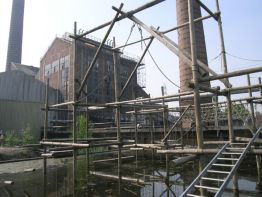Project Aim
The central aim was to strengthen the role of socio-economic development while enhancing sustainable water management along water corridors that connect wetlands, cities and the North Sea.
Project implementation and results
By drawing upon knowledge and experience of the five existing innovative Interreg IIIB projects NoLimp, MoPark, PURE, Watercity International II and TEN 3, the WE project activities have led to a sound analysis of the role of socio-economic development in enhancing sustainable water management. This has resulted in a stronger influence on the policies of regional and national organisations. The final publication presented best practices and a programme with project opportunities linking economical development along the waterline with sustainable water management procedures and strategies while implementing the European Water Framework Directive.
Innovative solutions
The main result was a shift towards an all-encompassing approach, in which socio-economic elements have been identified and included in the early phase of project development, thereby maximising the effects.
Waterline Economy showed that it is possible to connect economic goals within projects to implement European directives. This new approach is adopted by many authorities and organisations and generates better public support, political commitment and more positive attitude to European rules.
The development of the method of assessing benefits in projects via the Multi Criteria Analysis is unique in its own right, as it has marked the start of a new approach towards projects in general. The method has made it possible to “sell” ideas a lot easier, not so much because identified benefits can be monetised and deducted from the total expenses of a project, but because many new arguments can be used, to justify expenses on issues that would otherwise require much more debate.
Leverage of extra investment
In some regions, the results of Waterline Economy led to extra activities, which prepared ground for large-scale investments. These investments will mainly be made by local and regional authorities, partly by the lead partner and project partners.
Impact of the project
Long-term achievements and policy shaping
Organisations involved in the project have had their policies adjusted due to Waterline Economy. In Drenthe there is a political agreement for using project results, as new project plans are being developed.
Moreover, WE project results are foreseen to generate contribution towards Interreg IVB and/or other European programmes even after the closure of the project. |

Restore and innovate the water side for new economic development
Partners Provincie West-Vlaanderen, BE
Intercommunale Leiedal, BE
North Jutland County Council, DK
Landwirtschaftskammer Weser-Ems (We), DE
City of Göteborg, SE
Province of Fryslân, NL
Ministry of Agriculture, Nature and Food Quality (LNV), DLG, NL
Environment Agency, UK
Norfolk County Council, UK
LP:
Province of Drenthe
Project Manager
Ben van Os
Province of Drenthe Provinciehuis, Westerbrink 1
Postbus 122 NL-9400 AC Assen
The Netherlands
b.os@drenthe.nl
www.waterlineeconomy.eu
Tel: +31 592 36 56 65
Measure: 1.4
Start Date: 30 November 2005
End Date: 31 March 2008
ERDF Grant:
 385.235,00 385.235,00
Total Eligible Sum:
 770.470,00 770.470,00
|